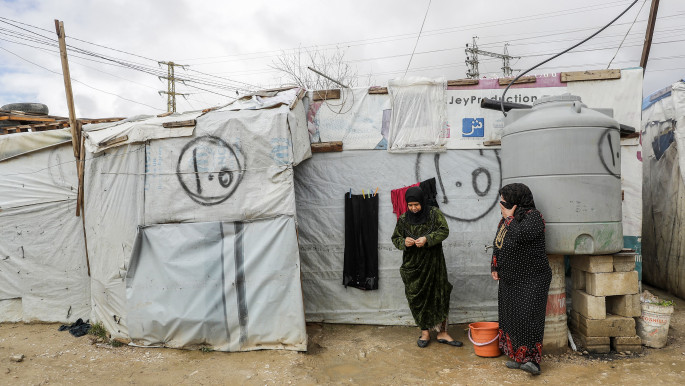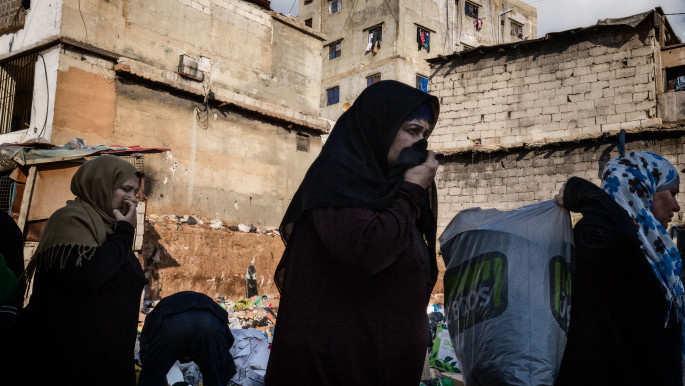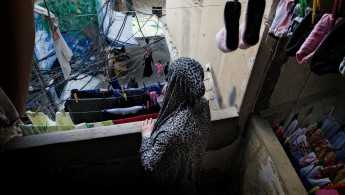'It wasn't like this in Syria': Displaced women speak out in Lebanon
Many look to women as a possible answer. Of the current Syrian population living in Syria, women greatly outnumber men. And in Syria's neighbouring countries, over 70 percent of refugees are women and children.
While there can be no doubt that this shift in demographics will impact Syria's societal fabric as the country emerges from the ashes of war, to what extent remains unclear.
So far, the consequences of civil war and displacement have forced opposite and contrasting changes in traditional gender structures, creating openings in certain places as well as a backlash of conservatism in others.
"It is obvious that women and children in all wars and in any crisis are the most vulnerable," says Mey Alsayegh, the Communication Manager of the Lebanese Ministry of State for Displaced Affairs.
"Women are moved into a new environment, often traumatised and with no guarantee of stability or future. Many are forced into child marriage or subject to a high risk of abuse."
 |
Women are moved into a new environment, often traumatised and with no guarantee of stability or future. Many are forced into child marriage or subject to a high risk of abuse |  |
Indeed, there has been a significant rise in gender-based violence against women both within Syria and among its refugee population since the start of the war.
However, for some women, war and displacement have brought about unexpected emancipation.
"This is a camp without men," Labeeba, tells us. A Syrian from Hama, she is the shawisha (leader) of a refugee tent settlement in northern Lebanon. "When we fled here five years ago, I was the only one with a phone, so they elected me to be the shawisha."
Most of the male relatives of the camp have either been killed, detained or are fighting back in Syria. Only a few old men live in Labeeba's camp, while a handful of others spend months away, working in Beirut or the Bekka valley.
"I am single, and I cannot have children. In Syria, I often felt worthless, but now I have a role and the responsibility to help people."
 |
|
| Syrian women talk to each other as they stand in the mud outside a tent at a refugee camp on the outskirts of the town of Zahle in Lebanon's Bekaa Valley [Getty] |
Before the war, Syria had established women's rights in national law. Equal opportunities for men and women in society, politics and the workplace were stipulated by Syria's 1973 constitution, whilst universal suffrage had already been introduced in 1949, two decades before European countries such as Switzerland (1971).
However, laws restricting women's rights exist simultaneously. Men, for example, are still allowed to forbid their wives to work outside the home unless explicitly mentioned in their wedding contract.
Further, where the rule of law is weak or corrupt, having rights on paper is no guarantee of implementation. Indeed, family and cultural pressures tend to play a stronger role in defining gender statuses.
"It's an excruciating paradox," a female Syrian activist from Raqqa tells us over the phone, wishing to keep her identity anonymous for safety.
"Even though I have dedicated my life to fighting for women's rights in Syria, it is hard to celebrate women gaining space and opportunity when the reason for this is that our men are dead or missing."
 |
Even though I have dedicated my life to fighting for women's rights in Syria, it is hard to celebrate women gaining space and opportunity when the reason for this is that our men are dead or missing |  |
Equally, few of the women who have been pushed into work by the war have managed to find anything other than menial labour.
Among Syrian refugees in Lebanon, the workforce is overwhelmingly female, with most women receiving less money for the same work a man might do.
Moreover, while women are taking new roles in the workplace, this still leaves them responsible for household work. And for many women, the dual responsibility of working and being the primary home provider is proving exhausting.
Suha, from the countryside of Homs, wakes up every morning at 5am to work the land for 1.5 dollars an hour. It is now 4pm and she has returned home just in time to prepare dinner.
"Sometimes, my daughter asks me to draw with her and my immediate reply is 'I don't want to'. My mind is too tired when I return home. It is enough just to manage to feed my children, we [mothers] struggle to support them psychologically as well."
Suha became a widow at 19. She was pregnant with her second child when her husband was killed by the drugs he used to try and blot out the trauma of war.
With one third of Syrian refugees' households headed by women, many Syrian women carry the dual responsibility of breadwinner and home provider.
"I've been in Lebanon for five years now, and I consider them as the garbage years of my life. Everything I lived here is marked by bad and dark memories."
 |
I've been in Lebanon for five years now, and I consider them as the garbage years of my life. Everything I lived here is marked by bad and dark memories |  |
Suha, like many Syrians, dreams of returning to Syria.
"I had friends in Syria. We used to go out to the market as late as 2am and it was safe. Here, there is no freedom for women."
Checking that no one was listening, Suha adds, "My brother-in-law forbids me to have Facebook, and he checks my WhatsApp messages to make sure I am not speaking to any men. And I am lucky to have a phone of my own!"
Her story is not unusual as the precarity of life in a foreign country has had the effect of making some refugee communities more conservative.
"I never leave the camp except to work." She paused. "It wasn't like this in Syria."
 |
|
| Women walk past rotting garbage in a market area of Sabra that borders the Shatila refugee camp [Getty] |
Caught between ever deteriorating living conditions in Lebanon and the ever growing desire to leave, many Syrians are weighing up the risk of returning home.
"For most men, return is still too dangerous. Even if you are not arrested or detained at the checkpoints, you will soon be drafted," says Sheik Ahmed, a Syrian community leader from the rif of Homs.
"Women instead have higher chances of passing through without being exposed to arbitrary detention. This is the reason many families are sending women and their elderly back to Syria."
For those returning, motivations vary. According to the Durable Solutions Platform the main reasons for return are lack of secure income and discrimination in host countries, coupled with the desire to be reunited with family and access medical care so often unaffordable in host countries. Seventy one percent of participants also sighted homesickness as a primary factor in returning.
"That is not to say it is safe for women to return. Just that they face different problems from the men," Sheikh Ahmed added.
Reports of arrest and detention at checkpoints are also common among women returning to Syria.
"Many families prefer sending women back first, as they think it less likely they will be stopped at checkpoints. Often they realise too late this is not the case."
 |
Many families prefer sending women back first, as they think it less likely they will be stopped at checkpoints. Often they realise too late this is not the case |  |
Um Izraa, 70-year-old grandmother, decided she was going to return to Aleppo when she found out the last of her family in Lebanon were travelling to Europe. Her wish was to die in her homeland.
"We agreed to her return, as we thought they were not going to arrest an old woman" Izraa, her eldest daughter, tells us. "But we were wrong."
| This article is the third in a six-part series investigating the issues of return of Syrian refugees from Lebanon. Read the first article here: Syrian refugees in Lebanon weigh the risks of returning against the risks of staying Read the second article here: History reflected: Memories of Lebanese displacement to Syria dismissed by Lebanese calling for Syrians' repatriation Read the third article here: Syrian displacement: A Palestinian perspective |
Izraa's mother was stopped at the checkpoint and detained for over a month in a nearby detention facility.
"The Syrian security services are looking for my brothers, so they are using my mother to try and get to them," Izraa told The New Arab.
Discrimination and violence on women has not been a prerogative of the regime only. Izraa tells us the story of Mariam, an old friend of hers at school, who returned to Deir az-Zour with her family in the early days of the revolution, after protests in Homs turned violent. She then lived under the rule of the Islamic State group [IS] before escaping to Lebanon in 2016.
"Once Daesh [Arabic word for IS] took hold of Deir az-Zour, Mariam could not leave the house without a male guardian. When her brothers left for Turkey, she was left at home with her old father. One day she decided to go to the market by herself. She was stopped at a checkpoint and kept in custody for two weeks." Izraa grimaced.
"Her father bribed the guards to let her out, but then did not want her at home any more. He could not bear the shame of what might have happened to her while in prison."
The social stigma attached to rape and sexual assault makes it a crime rarely spoken of, despite having been used as a common tactic of war by the regime and its opponents alike. Syrian women have borne much of the consequences of the war and violence in the country.
However, Syrian women have also moved into new spaces since the start of the war. In the northern regions of Syria, women have played a fundamental part of the Kurdish resistance movements whilst elsewhere in the country, many women have acted as a vital supply line for accessing food, aid and medical provisions in besieged cities.
The fact that many of Syria's examples of peaceful and non-violent engagement with the early revolution and throughout the conflict has been sustained and led by Syrian women, should be a strong argument to have women in the front line of any peace settlement.
We are yet to see this happen. However, alongside the terror of war and the burden of displacement, new gender roles are emerging.
Holding up the example of those Syrians on the ground who are putting women are the forefront of the country's future, could perhaps give Syria a greater chance of lasting peace.
Roshan De Stone is a human rights advocate working in Syrian refugee camps in Lebanon. She is a full-time contributor to Brush&Bow.
David L. Suber is a political researcher and journalist. He is directing a documentary on deportations from Europe and currently lives in Lebanon, where he works in refugee camps. David is a full-time contributor to Brush&Bow.



